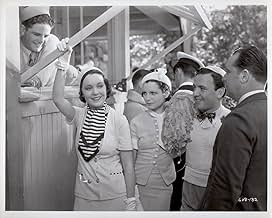Aggiungi una trama nella tua linguaAfter Nina Leeds finds out that insanity runs in her husband's family, she has a love child with a handsome doctor and lets her husband believes the child is his.After Nina Leeds finds out that insanity runs in her husband's family, she has a love child with a handsome doctor and lets her husband believes the child is his.After Nina Leeds finds out that insanity runs in her husband's family, she has a love child with a handsome doctor and lets her husband believes the child is his.
- Premi
- 3 vittorie e 1 candidatura in totale
Recensioni in evidenza
For the discerning viewer, recognizing the importance of the play (that the Marx Brothers found it grist for their satirical mill in their contemporary Broadway and film musical ANIMAL CRACKERS is testimony to that importance) and the solid performances of the movie cast, O'Neill delivers. He is examining serious adult issues - not just the form he is experimenting with - as he dissects the obligations people have to those they love.
While O'Neill claimed his play was suggested by an ancient Greek play, this classic love triangle (quadrangle actually, even more when one factors in Nina's chillingly named son) rings remarkably true even with the demands of 1930's Hollywood censorship (Nina's psychologically important abortion is merely hinted at) and the heavy editing (that O'Neill somewhat disingenuously railed at) demanded to bring the film down to an acceptable playing length for the average movie theatre which played more than the theatrically standard 8 performance week.
If Norma Shearer's central Nina can occasionally be accused of overacting, the script demands it; hers is the central emotional roller-coaster. Second billed Clark Gable as Dr. Darrell, who does not arrive for nearly a quarter hour into the film, gives the most naturalistic performance (it was one of the ways he stood out in all his films - in style a generation ahead of his peers), but for the true film connoisseur, Alexander Kirkland's Evans and Ralph Morgan's Marsden are no less impressive, and Robert Young, seven films into a 40 year career is fine as Nina's college age son.
In the 1930's the causes of mental illness OTHER than "bad blood" (a plot driving device here, as in Katharine Hepburn's debut vehicle from the same year - also from Broadway - A BILL OF DIVORCEMENT) were far less understood than today, and the Catholic Church's ban on the rational use of contraception was far more pervasive - both of which may make the context of the film difficult for younger viewers to understand.
If they give the film their attention though, and recognize that the concerns of the characters go beyond these technicalities to the personal relationships that remain troublesome even today, the film - stylistic experiments and all - is ultimately not only important but deeply fulfilling.
For this movie version, Robert Z. Leonard has the performers reveal their "inner thoughts" in voice-overs. You will recognize the technique, which is not unusual (in smaller doses). In this film, the voice-overs are a distraction - for the most part, they reveal nothing the cast can't reveal through cinematic acting. Mr. Leonard should have considered aborting the spoken asides. Obviously, Norma Shearer (as Nina Leeds) and her stellar co-stars are capable of revealing their "inner thoughts" in close-up - so, the voice-overs are superfluous.
The film is about Shearer's love for four different men: the idealized "Gordon Shaw" (an unseen World War casualty), darkly passionate Clark Gable (as Ned Darrell), popular and successful Alexander Kirkland (as Sam Evans), and ever unrequited Ralph Morgan (as Charlie Marsden). The men have exquisitely trimmed moustaches. Shearer marries one of them - but, fearing heredity insanity will befall her child, she gets herself pregnant by another. The film does not explicitly reveal that "Nina" aborted her first pregnancy.
Photographer Lee Garmes, art director Cedric Gibbons, and the MGM crew make the production look first class all the way. Henry B. Walthall (as father Leeds), May Robson (as mother Evans), Tad Alexander (as young Gordon), Robert Young (as older Gordon), and Maureen O'Sullivan (as Madeline) offer outstanding support. Just try to edit out the "strange interludes" in your mind...
******* Strange Interlude (12/30/32) Robert Z. Leonard ~ Norma Shearer, Clark Gable, Alexander Kirkland
Lo sapevi?
- QuizWhen Maureen O'Sullivan first met Clark Gable on the set, he was in his old-age makeup. He asked her out on a horseback-riding date, but thinking he was too old for her, she turned him down. Later when she was doing some voice-overs, she saw him without makeup and regretted her decision. Gable never asked her out again.
- BlooperAfter Charlie's last line, a shadow of the boom microphone can be seen moving off the back of the wicker chair before the camera starts pulling back.
- Citazioni
Nina Leeds: [Inner thoughts] You do love me, Ned.
Dr. Ned Darrell: [Inner thoughts] I don't love you.
Charlie Marsden: [Inner thoughts] Darrell and Nina. There's something unnatural here. Love and hate and lust! Where's Sam? Why isn't he here? I hate Nina! I must punish her!
- ConnessioniReferenced in Hollywood Hist-o-Rama: Norma Shearer (1962)
- Colonne sonoreSymphony No.5 in E Minor, Op.64
(1888) (uncredited)
Written by Pyotr Ilyich Tchaikovsky
Excerps from the second movement played during the opening credits
I più visti
- How long is Strange Interlude?Powered by Alexa
Dettagli
Botteghino
- Budget
- 654.000 USD (previsto)
- Tempo di esecuzione
- 1h 49min(109 min)
- Colore
- Proporzioni
- 1.37 : 1































